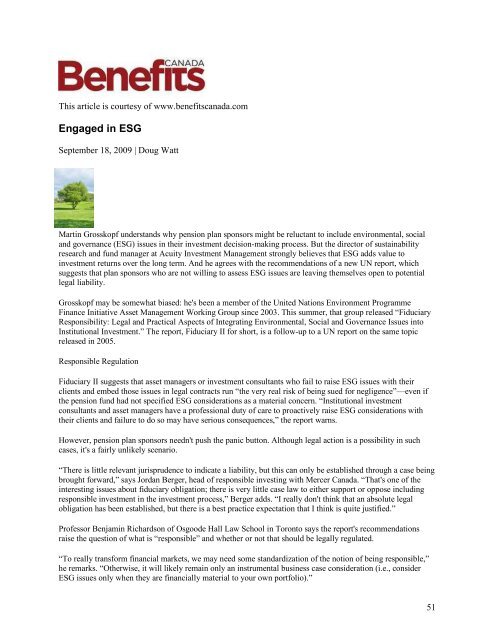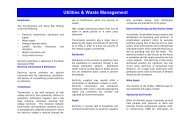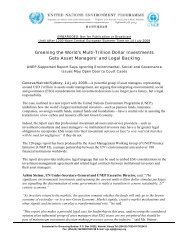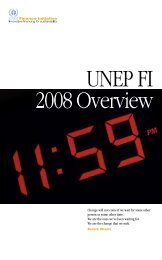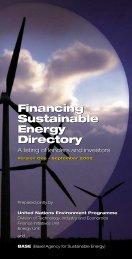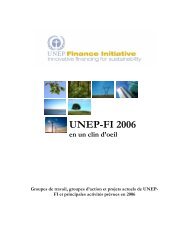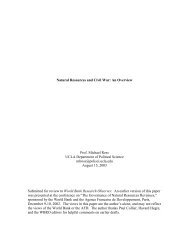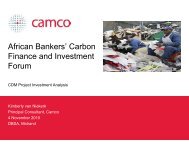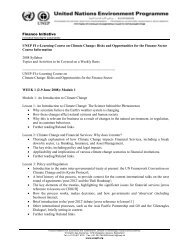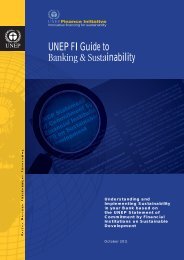UNEP FI Asset Management Working Group The - UNEP Finance ...
UNEP FI Asset Management Working Group The - UNEP Finance ...
UNEP FI Asset Management Working Group The - UNEP Finance ...
You also want an ePaper? Increase the reach of your titles
YUMPU automatically turns print PDFs into web optimized ePapers that Google loves.
This article is courtesy of www.benefitscanada.com<br />
Engaged in ESG<br />
September 18, 2009 | Doug Watt<br />
Martin Grosskopf understands why pension plan sponsors might be reluctant to include environmental, social<br />
and governance (ESG) issues in their investment decision-making process. But the director of sustainability<br />
research and fund manager at Acuity Investment <strong>Management</strong> strongly believes that ESG adds value to<br />
investment returns over the long term. And he agrees with the recommendations of a new UN report, which<br />
suggests that plan sponsors who are not willing to assess ESG issues are leaving themselves open to potential<br />
legal liability.<br />
Grosskopf may be somewhat biased: he's been a member of the United Nations Environment Programme<br />
<strong>Finance</strong> Initiative <strong>Asset</strong> <strong>Management</strong> <strong>Working</strong> <strong>Group</strong> since 2003. This summer, that group released “Fiduciary<br />
Responsibility: Legal and Practical Aspects of Integrating Environmental, Social and Governance Issues into<br />
Institutional Investment.” <strong>The</strong> report, Fiduciary II for short, is a follow-up to a UN report on the same topic<br />
released in 2005.<br />
Responsible Regulation<br />
Fiduciary II suggests that asset managers or investment consultants who fail to raise ESG issues with their<br />
clients and embed those issues in legal contracts run “the very real risk of being sued for negligence”—even if<br />
the pension fund had not specified ESG considerations as a material concern. “Institutional investment<br />
consultants and asset managers have a professional duty of care to proactively raise ESG considerations with<br />
their clients and failure to do so may have serious consequences,” the report warns.<br />
However, pension plan sponsors needn't push the panic button. Although legal action is a possibility in such<br />
cases, it's a fairly unlikely scenario.<br />
“<strong>The</strong>re is little relevant jurisprudence to indicate a liability, but this can only be established through a case being<br />
brought forward,” says Jordan Berger, head of responsible investing with Mercer Canada. “That's one of the<br />
interesting issues about fiduciary obligation; there is very little case law to either support or oppose including<br />
responsible investment in the investment process,” Berger adds. “I really don't think that an absolute legal<br />
obligation has been established, but there is a best practice expectation that I think is quite justified.”<br />
Professor Benjamin Richardson of Osgoode Hall Law School in Toronto says the report's recommendations<br />
raise the question of what is “responsible” and whether or not that should be legally regulated.<br />
“To really transform financial markets, we may need some standardization of the notion of being responsible,”<br />
he remarks. “Otherwise, it will likely remain only an instrumental business case consideration (i.e., consider<br />
ESG issues only when they are financially material to your own portfolio).”<br />
51


